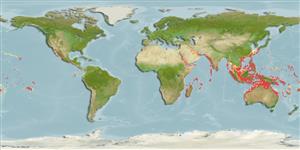Common names from other countries
Environment: milieu / climate zone / depth range / distribution range
Ekologi
marina revassocierade; djupintervall 2 - 80 m (Ref. 90102). Tropical; 32°N - 32°S
Indo-West Pacific: India and Sri Lanka eastward to Tonga; south to Australia; north to Japan.
Size / Vikt / Age
Maturity: Lm ? range ? - ? cm
Max length : 17.0 cm TL hane/ej könsbestämd; (Ref. 9710)
Taggstrålar i ryggfenan (totalt) : 13; Mjukstrålar i ryggfenan (totalt) : 9 - 10; Taggstrålar i analfenan: 3; Mjukstrålar i analfenan: 5 - 6. Body reddish with vague broad bars; paired fins with bars; median fins with small dark spots (Ref. 4313). Mid-dorsal spines shorter than body depth (Ref. 37816).
Common in reef flats and shallow lagoons, in areas with weed-covered rocks on sandy substrates. Adults often found on sponges and juveniles are sometimes found in small aggregations on remote bommies with 10 or so individuals (Ref. 48635). Nocturnal. Feeds on small crustaceans (Ref. 37816).
Life cycle and mating behavior
Maturities | Reproduktion | Spawnings | Egg(s) | Fecundities | Larver
Distinct pairing (Ref. 205). Females possess specialized ovarian structures including stalk-like ovigerous lamellae and secretory epithelia (Ref. 32832).
Eschmeyer, W.N., 1986. Scorpaenidae. p. 463-478. In M.M. Smith and P.C. Heemstra (eds.) Smiths' sea fishes. Springer-Verlag, Berlin. (Ref. 4313)
IUCN Red List Status (Ref. 130435)
CITES (Ref. 128078)
Not Evaluated
Human uses
Fiskeri: husbehovsfiske; Akvarium: Kommersiell
Verktyg
Special reports
Download XML
Internet-källor
Estimates based on models
Preferred temperature (Ref.
115969): 24.4 - 29, mean 27.8 (based on 1188 cells).
Phylogenetic diversity index (Ref.
82804): PD
50 = 0.5078 [Uniqueness, from 0.5 = low to 2.0 = high].
Bayesian length-weight: a=0.01230 (0.00700 - 0.02163), b=3.11 (2.96 - 3.26), in cm Total Length, based on LWR estimates for this species & (Sub)family-body (Ref.
93245).
Trofisk nivå (Ref.
69278): 3.6 ±0.4 se; based on diet studies.
Resiliens (Ref.
120179): Mellan, lägsta populationsfördubblingstid 1,4-4,4 år (Preliminary K or Fecundity.).
Fishing Vulnerability (Ref.
59153): Low vulnerability (10 of 100).
